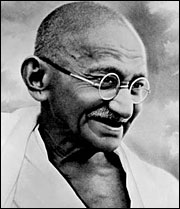
In recent days, we commemorated the legacy of Martin Luther King, Jr., who died 40 years ago this month. And some have also recalled that King was influenced by Gandhi, learning from Gandhi’s Satyagraha or “truth force” movement the nonviolent tactics that ultimately made the civil rights movement a success.
Philip Glass’s opera “Satyagraha,” which thematizes this, is being revived now at the New York Metropolitan Opera. Now is a good time to remember Gandhi and King, not just in celebration of what they achieved, but because we need them again today. We need them not only to inspire social change in the today’s world, but also to inspire a movement to save it from global warming.
Scientists tell us clearly that we must drastically cut greenhouse gas emissions, just at the moment when fossil fuel demand is at record highs and accelerating. India and China’s economies and the world’s population are exploding to levels the planet has never borne before.
The need to reduce our impacts is actually a tremendous opportunity to build a green economy, green jobs, and green infrastructure. But first it will require us — the developed world, emerging economies, oil and coal interests — to change the way we think. As Einstein said, “You cannot solve a problem at the same level of consciousness that created it.” So the first task in tackling global climate change is to change our own consciousness.
Gandhi and King understood this. In fact, they eerily anticipated our predicament and speak to us across the decades about it. They both quite clearly foresaw a time when technological development divorced from development of consciousness would threaten the survival of the planet.
In his last sermon before his death, King said, “Through our scientific and technological genius, we have made of this world a neighborhood and yet we have not had the ethical commitment to make of it a brotherhood … We must all learn to live together as brothers or we will all perish together as fools.” Almost a century ago, Gandhi said, “God forbid that India should ever take to industrialism after the manner of the West … If [our nation] took to similar economic exploitation, it would strip the world bare like locusts.”
They also told and showed us what to do about it. Satyagraha or “truth force” for Gandhi meant doing the internal work of embracing the truth of nonviolence. It meant recognizing the shared humanity and ultimate non-separation between people, even those on opposite sides of a burning question. The power of this truth gave Gandhi and King the strength to lead, to convert opponents to admirers and even collaborators. King expressed it in Biblical terms as agape, the power of love, and said in the same sermon: “We are tied together in the single garment of destiny, caught in an inescapable network of mutuality.”
Such ideas have a strong ecological ring today. In fact, Al Gore had Gandhi’s “truth force” in mind when he coined “Inconvenient Truth.” He said this in a 2007 speech:
Global warming is, first and foremost, a challenge to the moral imagination … Gandhi used the word satyagraha, or “truth force.” In American politics, there have been soaring moments throughout our history when the truth has swept aside entrenched power. In the darkest hours of our Civil War, Abraham Lincoln said, “We must disenthrall ourselves, and then we shall save our country.” We need once again to disenthrall ourselves.
Like other struggles for freedom, disenthralling ourselves from the patterns causing climate change and embracing the truth is just as much an inner journey as an outer movement. As Gandhi said, we must be the change we wish to see in the world. Changing entrenched power in favor of truth begins within, challenging our own moral imagination, changing our own thinking. If we can learn, for example, to recognize that we really are part the same inescapable network of mutuality as the coal miner, the factory worker in China, the farmer in India, a global climate movement will turn opponents to admirers and even collaborators.
Such inner work is within the scope of any committed person, and it is the key to changing the world. Anyone who questions what they can really do to affect global climate change themselves should remember Gandhi and King and their followers confidently transformed the British empire and Jim Crow, not with outward force, but with a personal relationship to the truth, not by constraining and defeating opponents, but by inspiring them. We can do it, too.

